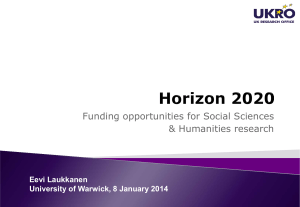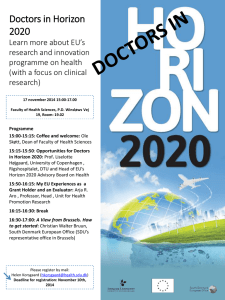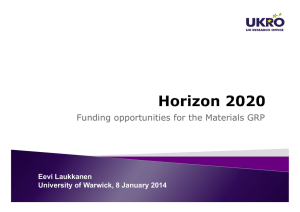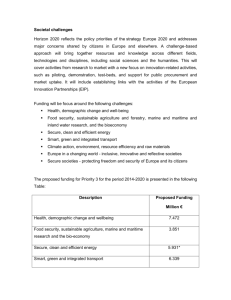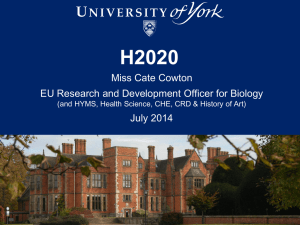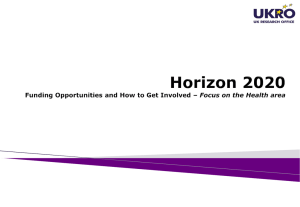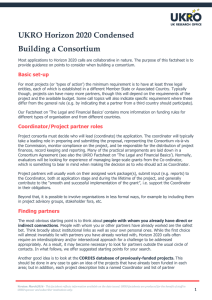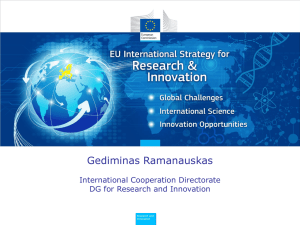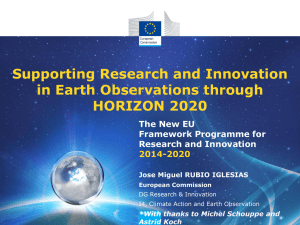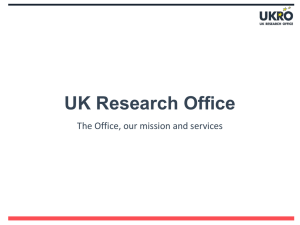Funding opportunities for the Food GRP Eevi Laukkanen
advertisement
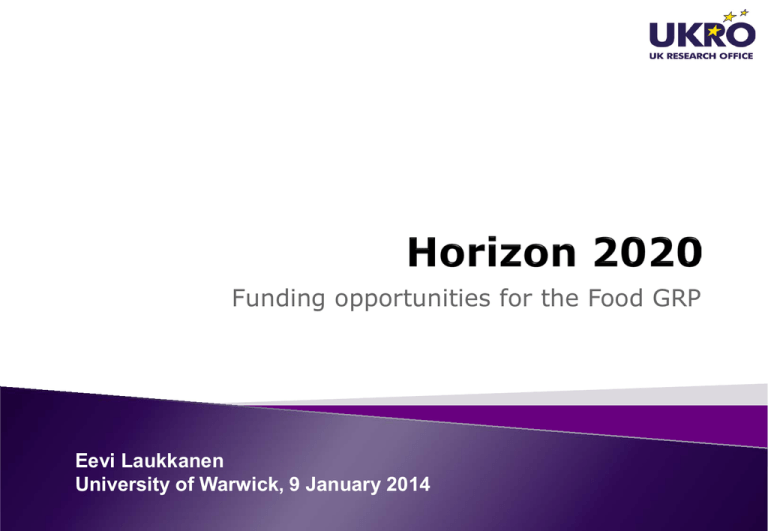
Funding opportunities for the Food GRP Eevi Laukkanen University of Warwick, 9 January 2014 UKRO’s Mission: “To promote effective UK engagement in EU research, innovation and higher education activities” The Office: • Is based in Brussels, was established in 1984 • Is sponsored by the seven UK Research Councils • Around 130 research organisations subscribe to UKRO UKRO services: offering a suite of quality services to help subscribers and sponsors to make informed decisions on participating in EU programmes Policy work: supporting UK input into European research policy development and implementation Brussels liaison: establishing and maintaining contacts with the European Institutions and other major Brussels stakeholders in research and innovation. UKRO Portal – www.ukro.ac.uk : tailored news articles and clear and accessible web pages on the latest in EU funding Enquiry service: individual support through your dedicated European Advisor Annual briefing visits: bespoke training for your institution Meeting room: a venue in Brussels Tailored news articles on EU funding • Calls for proposals • Funding and policy news • Events, partner searches, job opportunities Web pages on EU research programmes and policy Email alert function/ news by topic Daily, weekly, only on your discipline? Personalise your account to best meet your needs! Create your profile today! UK National Contact Point: • Marie Curie Actions www.ukro.ac.uk/mariecurie • European Research Council www.ukro.ac.uk/erc European RTD Insight: Free monthly publication funded by the British Council UKRO training and development programme: complementing annual visits UKRO Annual Conference: a key event for EU policy and networking Brief overview The European Union’s funding instrument for research and innovation (2014-2020) Horizon 2020 overarching priority: Exiting the economic crisis through sustainable growth • Budget of € 70.2 billion • Coupling research to innovation – from basic research to bringing ideas to the market • Focus on societal challenges EU society is facing (e.g. health, clean energy, food security, integrated transport) • Focuses resources on areas of high growth and innovation potential • Key measures to support industrial leadership, particularly innovative SMEs • More open, bottom up areas • Significant investment in excellence • Promise of simplified access for all • Leverage private investment in key technologies (PPPs, JTIs) • Encourages pooling of resources through Public-Public partnerships Excellent Science Industrial Leadership Societal Challenges Health and Wellbeing European Research Council (ERC) Leadership in Enabling and Industrial Technologies (LEIT) ICT, KETs, Space Future and Emerging Technologies (FET) Marie Skłodowska-Curie Actions (MSCA) Research Infrastructures Food security Transport Energy Climate action Access to Risk Finance Societies Security Innovation in SMEs Widening Participation; Science with and for Society European Institute of Innovation and Technology (EIT) EURATOM Joint Research Centre (JRC) Overall objective: “to strengthen the excellence of European research” World class science is the foundation of tomorrow’s technologies, jobs and wellbeing Europe needs to develop, attract and retain research talent Researchers need access to the best infrastructures Total budget €21.6 billion Strategic investments in key technologies (e.g. advanced manufacturing, nanotechnologies and materials) underpin innovation across existing and emerging sectors Europe needs to attract more private investment in research and innovation Europe needs more innovative SMEs to create growth and jobs Emphasis on combining enabling technologies to find solutions for societal challenges – particularly energy efficiency targets, sustainability and climate change objectives Total budget €15.04 billion Concerns of citizens and society + EU policy objectives Breakthrough solutions come from multi-disciplinary collaborations, including social sciences and humanities Addressing challenges requires full research & innovation cycle, from research to market Focus on policy priorities without predetermining technologies or types of solutions to be developed Total budget €26.2 billion Excellent Science Industrial Leadership Societal Challenges • Bottom-up funding • Defined topics • Defined topics • Basic and applied research • Applied research • Applied research • Investigator centred projects (ERC) • Transnational, multidisciplinary, multisectoral projects • Transnational, multidisciplinary, multisectoral projects • PhD training (MSCA) • Innovation Actions • Fellowships (MSCA) • Research & Innovation Actions • Research & Innovation Actions • Networking (MSCA) • Transnational, collaborative projects for novel technology ideas / concepts (FET) • “Excellence over impact?” • Innovation Actions • SME actions • SME actions • Industrial problem solving • Societal problem solving • “Impact over excellence?” • “Impact over excellence?” 28 EU Member States (Croatia joined in 2013) Associated Countries (similar list to FP7 expected) Third countries (funding will depend on GDP) • BRIC no longer eligible for automatic funding • List of eligible third countries in Horizon 2020 ‘General Annexes’: http://ec.europa.eu/research/participants/data/ref/h2020/wp/20 14_2015/annexes/h2020-wp1415-annex-ga_en.pdf Basic model for ‘Research and Innovation actions’ = collaborative projects • 100% direct costs + • 25% indirect costs (overhead) Basic model for “Innovation actions” projects = collaborative closer to market projects • 70% direct costs + • 25% indirect costs For Universities involved in innovation projects: 100% direct costs Some calls different – e.g. inducement prizes Marie Curie calls different – fixed allowances 2014-2016 Strategic Programme Aims at ensuring a coherent, evidence-based implementation Will guide the preparation of the work programmes Defines areas of special focus for the first work programmes 2014-2015 Work Programmes Two-year work programmes Common topics structure: “Specific challenge”, “Scope”, “Expected Impact”, “Type of action” Pillar 1 – Excellent Science The ERC seeks to fund the best ‘frontier research’ proposals submitted by excellent researchers, with excellence as the single peer review criterion. Will fund projects led by a Principal Investigator, if necessary supported by a team (no need for pan-European collaboration) Will operate on a ‘bottom-up’ basis, without pre-determined research priorities. 25 panels in 3 domains which proposals can be submitted to: Physical Sciences and Engineering Life Sciences Social Sciences and Humanities Total ERC budget: €11.6bn (compared with €7.5bn in FP7) Starting Grants 2-7 years postdoc Up to €1.5-2m for 5 years Consolidator Grants 7–12 years postdoc Up to €2-2.75m for 5 years Advanced Grants Leading researchers Up to €3-3.5m for 5 years Synergy Grants 2 – 4 PIs Up to €15m for 6 years Proof of Concept ERC grant holders €150k for up to 18 months Horizon 2020 general funding rate of 100% direct + 25% indirect costs applies Call identifier Publication date Deadline ERC-2014-StG 11 December 2013 25 March 2014 ERC-2014-CoG 11 December 2013 20 May 2014 ERC-2014-AdG 17 June 2014 21 October 2014 ERC-2014-PoC 11 December 2013 1 April 2014 1 October 2014 ERC-2015-StG tbc 3 February 2015 ERC-2015-CoG tbc 12 March 2015 ERC-2015-AdG tbc 2 June 2015 ERC-2015-PoC tbc 23 April 2015 1 October 2015 Call budget, €M (estimated number of grants) 485 (370) 713 (400) 450 (200) 15 (100) 411 (315) 603 (340) 640 (285) 15 (100) Operates in a ‘bottom-up’ basis Open to all research and innovation domains – from basic research to market take-up Mobility is a key requirement Aim: develop new knowledge / enhance skills of people behind research and innovation Dissemination and public engagement through public outreach activities Total budget: €6.2bn (compared with €4.7bn in FP7) Horizon 2020 - MSCA ITN IF RISE COFUND Innovative Training Networks (Early Stage Researchers) Individual Fellowships (Experienced Researchers) Research and Innovation Staff Exchange (Exchange of Staff) Cofunding or regional, national and international programmes Simplified funding, based on unit costs Call identifier Publication date Deadline Call budget, €M MSCA-ITN-2014 11 December 2013 09 April 2014 405.18 MSCA-RISE-2014 11 December 2013 24 April 2014 70 MSCA-IF-2014 12 March 2014 11 September 2014 240.50 MSCA-COFUND2014 10 April 2014 02 October 2014 80 MSCA-ITN-2015 02 September 2014 13 January 2015 370 MSCA-RISE-2015 06 January 2015 28 April 2015 80 MSCA-IF-2015 12 March 2015 10 September 2015 213 MSCA-COFUND2015 14 April 2015 01 October 2015 80 Pillar 2 – Industrial Leadership Pillar 3 – Societal Challenges Horizon 2020 collaborative projects are a little different! • A strong challenge-based approach – broader topics • Covers whole research to close-to-market continuum • Strong involvement of industry, especially SMEs • Applicants have considerable freedom to come up with innovative solutions – less prescription • Strong emphasis on expected impact • More cross-cutting aspects (e.g. SSH, gender, international collaboration) Research and innovation actions (R&I) Innovation actions Co-ordination and support actions (CSA) Prizes Fast-track to innovation SME instrument ERA-NET Cofund Pre-Commercial Procurement (PCP) Public Procurement of Innovative Solutions (PPI) Description • “Action primarily consisting of activities aiming to establish new knowledge and/or to explore the feasibility of a new or improved technology, product, process, service or solution” Funding rate: 100% + 25% indirect costs Multi-beneficiary • Minimum: three legal entities each of which established in a different Member State or associated country Respond to challenges set in the Societal challenges or Industrial Leadership pillars Bottom up in FET open (directed in FET proactive) Description • “Action primarily consisting of activities directly aiming at producing plans and arrangements or designs for new, altered or improved products, processes or services. For this purpose they may include prototyping, testing, demonstrating, piloting, large-scale product validation and market replication” Funding rate: 70% (100% for non-profit) + 25% indirects Multi-beneficiary • Minimum: three legal entities each of which established in a different Member State or associated country Respond to challenges set in the Societal challenges or Industrial Leadership pillars Description • “Action consisting primarily of accompanying measures such as standardisation, dissemination, awareness-raising and communication, networking, coordination or support services, policy dialogues and mutual learning exercises and studies, including design studies for new infrastructure” Funding: 100% + 25% indirects Mono or Multi-beneficiary • Minimum one legal entity established in a Member State or Associated Country Respond to direction given in the Societal Challenges or Industrial Leadership pillars, and in FET Pillar 2 – Industrial Leadership Emphasis on combining enabling technologies to find solutions for societal challenges – particularly energy efficiency targets, sustainability and climate change objectives Cross-cutting themes: • Integration of technologies • Demonstration of capacity to make and deliver innovative products and services • User and customer pilots to prove feasibility and added value TRL 1 Basic principles observed TRL 2 Technology concept formulated TRL 3 Experimental proof of concept TRL 4 Technology validated in lab TRL 5 Technology validated in relevant environment (industrial environment in the case of KETs) TRL 6 Technology demonstrated in relevant environment (industrial environment in the case of KETs) TRL 7 System prototype demonstration in operational environment TRL 8 System complete and qualified TRL 9 Actual system proven in operational environment (competitive manufacturing in the case of KETs; or in space Strong focus on industrial involvement and applied research Developing industrial capacity in focus areas: • Key Enabling Technologies (KETs) Micro- and nano-electronics, Photonics Nanotechnologies Advanced Materials Biotechnology Advanced Manufacturing and Processing ICT in Leadership in enabling and industrial technologies (LEIT) New generation of components and systems Content technologies and information management Advanced Computing Future Internet Robotics Micro- and nano-electronic technologies/ Photonics KETs Cross-cutting and horizontal activities and International Co-operation Robotics PPP 5G PPP Photonics PPP Overall aim is to bring the benefits of progress in technologies to European citizens and businesses ICT can help address Europe's societal challenges (e.g. sustainable healthcare, healthy ageing, better security, lower carbon economy, intelligent transport) Support for development of ICT in ‘Excellent Science’, ICT in ‘Industrial Leadership’ and ICT in ‘Societal Challenges’ Pillar 3 – Societal Challenges Societal Challenges € bn SC1 Health, demographic change and wellbeing 6.6 SC 2 Food security, sustainable agriculture, marine and maritime research & the Bioeconomy 3.4 SC3 Secure, clean and efficient energy 5.2 SC4 Smart, green and integrated transport 5.6 SC5 Climate action, environment, resource efficiency and raw materials 2.7 SC6 Inclusive, innovative and reflective societies 1.2 SC7 Secure societies 1.5 Cross-cutting theme in H2020 LEIT: Factories of the Future Challenge 6: Cultural heritage and European identities Challenge 6: Europe in a changing world Challenge 3: Secure, Clean and Efficient Energy LEIT: Advanced materials Challenge 2: Food Security Challenge 1: Health, demographic change and wellbeing Challenge 6: Europe as a global actor Challenge 5: Climate action Challenge 4: Smart, Green and Integrated Transport Food Challenge Energy Challenge Transport Challenge Climate Challenge Health Challenge Security Challenge IIR Challenge Sustainable food security (Societal Challenge 2) Availability and access to sufficient safe and nutritious food Competitive and resource-efficient aquatic and terrestrial food production systems covering: Eco-intensification of production; Sustainable management of natural resources (including climate change mitigation and adaption); Technologies for a sustainable food chain; Reduction of food waste and exploitation of food processing by-products in the food chain; Safe foods and healthy diets for all; A global food security chain. Blue Growth: unlocking the potential of seas and oceans (Societal Challenge 2 Food) (contributions from SC3 Energy, SC4 Transport, SC5 Climate) Improve the understanding of the complex interactions between various maritime activities, technologies, including space enabled applications, and the marine environment to help boost the potential of the marine and maritime economy through research and innovation Valorising the diversity of marine life Sustainable harvesting the deep-sea resources New offshore challenge Ocean observation technologies Socio-economic dimension Waste: a resource to recycle, reuse and recover raw materials (Societal Challenge 5 Climate) (contributions from SC2 Food, WP5 Nanotech/biotech) Boost development of innovative, environmentally friendly and cross-sectoral waste management solutions; Build a better understanding of environmental impact of human activities; Raise societal awareness in order to use resources effectively Mitigate dependency on imported raw materials Whole production and consumption cycle from waste prevention and the design of products and processes to waste disposal or reuse including organisational, management and behavioural change Health, demographic change and wellbeing Examples of 2014-15 topics for food research: Focus area: Personalising health and care Effective health promotion, disease prevention, preparedness and screening • PHC-07-2014: Improving the control of infectious epidemics and foodborne outbreaks through rapid identification of pathogens Implemented as single stage call for ‘Research and Innovation Actions’, deadline on 15 April 2014 Minor, diet-related, food research aspects also in: Integrated, sustainable, citizen-centred care • PHC 26 – 2014: Self-management of health and disease: citizen engagement and mHealth • PHC 28 – 2015: Self-management of health and disease and decision support systems based on predictive computer modelling used by the patient him or herself Food Security, Sustainable Agriculture, Marine and Maritime Research and the Bio-economy Examples of 2014-205 topics for food research: Focus area: Sustainable Food Security Sustainable food production systems • SFS-1-2014/2015: Sustainable terrestrial livestock production • SFS-2-2014/2015: Sustainable crop production • SFS-3-2014: Practical solutions for native and alien pests affecting plants • SFS-4-2014: Soil quality and function • SFS-5-2015: Strategies for crop productivity, stability and quality • SFS-7-2014/2015: Genetic resources and agricultural diversity for food security, productivity and resilience • SFS-9-2014: Towards a gradual elimination of discards in European fisheries • SFS-10-2014/2015: Tackling disease related challenges and threats faced by European farmed aquatic animals • SFS-11-2014/2015: Implementation of an Ecosystem-based approach for European aquaculture Implemented as two-stage calls for ‘Research & Innovation Actions’ 2014 deadline: 12 March 2014 Safe food and healthy diets and sustainable consumption • SFS-12-2014: Assessing the health risks of combined human exposure to multiple food-related toxic substances • SFS-13-2015: Biological contamination of crops and the food chain • SFS-14-2014/2015: Authentication of food products • SFS-15-2014: Proteins of the future • SFS-16-2015: Tackling malnutrition in the elderly • SFS-17-2014: Innovative solutions for sustainable novel food processing Global drivers of food security • SFS18-2015: Small farms but global markets: the role of small and family farms in food and nutrition security • SFS19-2014: Sustainable food and nutrition security through evidence based EU agro-food policies • SFS20-2015: Sustainable food chains through public policies: the cases of the EU quality policy and public sector food procurement Implemented as two-stage calls for ‘Research & Innovation Actions’ and ‘Innovation Actions’ (SFS-17-2014) 2014 deadline: 12 March 2014 Focus are: Blue Growth Sustainably exploiting the diversity of marine life • BG-1-2015: Improving the preservation and sustainable exploitation of Atlantic marine ecosystems • BG-2-2015: Forecasting and anticipating effects of climate change on fisheries and aquaculture Horizontal aspects, socio-economic sciences, innovation, engagement with society and ocean governance across the blue growth focus area • BG10-2014: Consolidating the economic sustainability and competitiveness of European fisheries and aquaculture sectors to reap the potential of seafood markets Implemented as two-stage calls for ‘Research & Innovation Actions’ 2014 deadline: 12 March 2014 Innovative, Sustainable and Inclusive Bioeconomy Sustainable Agriculture and Forestry • ISIB-1-2014: Provision of public goods by EU agriculture and forestry: Putting the concept into practice • ISIB-3-2015: Unlocking the growth potential of rural areas through enhanced governance and social innovation Implemented as two-stage calls for ‘Research & Innovation Actions’ , 2014 deadline on 12 March 2014 Cross-cutting actions covering all activities • ISIB-8-2014: Towards an innovative and responsible bioeconomy Implemented as one-stage calls for ‘Coordination & Support Action’ , deadline on 26 June 2014 Climate action, resource efficiency and raw materials Examples of 2014-2015 topics for food research Focus area: Waste – A resource to recycle, reuse and recover raw materials Towards a near zero waste society • WASTE-2-2014: A systems approach for the reduction, recycling and reuse of food waste Implemented as a two-stage call for ‘Research & Innovation Actions’ Deadline on 8 April 2014 Focus area: Water Innovation – Boosting its value for Europe Treasuring our water • WATER-2-2015 Integrated approaches to food security, low-carbon energy, sustainable water management and climate change mitigation Implemented as a two-stage call for ‘Research & Innovation Actions’ European Commission pages on EU-funded research on the bioeconomy, plus details of new EU Bioeconomy Strategy: • http://ec.europa.eu/research/bioeconomy/policy/ European Commission pages on EU ‘Blue Growth’ strategy: • http://ec.europa.eu/maritimeaffairs/policy/blue_growth/index_en.htm European Innovation Partnership on Agriculture: • http://ec.europa.eu/agriculture/eip/ Joint Programming Initiative on Agriculture, Food Security and Climate Change (UK among the participating countries): • http://www.faccejpi.com/ Practicalities of proposal preparation Two selection criteria • Financial capacity: in line with financial regulation and rules for participation • Operational capacity: assessed ability to carry out the project effectively Three award criteria • Excellence, Impact, Implementation Each criteria scored out of 5 • Threshold for each is 3 • Overall threshold: 10 • For innovation actions impact score weighted at 1.5 Proposals then ranked by scores Projects funded according to ranking within budget Priority order for proposals with same score • Highest excellence score*; then highest impact score*; then size of budget for SMEs; then gender balance in project team *) for ‘Innovation actions’ this order is reversed The extent to which work corresponds to topic description Clarity and pertinence of objectives Credibility of approach Soundness of approach including transdisciplinary aspect Progress beyond state of art Quality and efficiency of implementation Coherence and effectiveness of the work plan, including appropriateness of allocation of tasks and resources Appropriateness of management structures and procedures, including risk management The extent to which project outputs will contribute at European and/or international level to • Enhancing innovation capacity and integration of knowledge • Strengthening the competitiveness and growth of companies by developing and delivering innovations meeting the needs of European and global markets Effectiveness of the proposed project to exploit and disseminate results (including management of IPR), to communicate the project, and to manage research data where relevant Note: for innovation actions impact criterion weighted at 1.5 Check the Horizon 2020 calls - do they cover your research area? Get active with networking and building links with potential partners Who are the key players? Who has been involved in previous projects / stakeholder groups? How can you meet them? • Attending national, Commission and other brokerage events • Joining the EU evaluators database • Joining relevant stakeholder groups ERC, Marie Sklodowska-Curie are bottom-up! Sign up for UKRO Portal, and choose ‘policy’ category Participation options • Coordinator = responsible for leading the project, managing the project finances and representing the Consortium vis-à-vis the Commission • Partner = responsible for delivering its part of the project and managing its share of the funding Third parties: • Sub-contractor = contracted by one of the beneficiaries to carry out specialised tasks that are not ‘core’ project tasks • Other third party = making available its resources to a beneficiary or in very specific cases carrying out parts of the work on behalf of a beneficiary Beneficiaries Co-ordinator Prepares and submits proposal Links with the Commission and the consortium members Monitors compliance on the project Financial distribution, record keeping, reports to the Commission Organises scientific and project management meetings Maintains the Consortium agreement Partner Works on their work package(s) Submits reports to Co-ordinator • • • • • • • Be focused and know what you want to do Find out who the key ‘players’ are Take up all opportunities for contact Raise your profile Consider what your ‘unique selling point’ is Attend EC Information days – good networking opportunity Use networks and other EU initiatives to “advertise” your availability and expertise • • • • • • • Existing contacts FP7 Projects: http://cordis.europa.eu/fp7/projects_en.html EU conferences (including information events around Horizon 2020 calls): http://ec.europa.eu/programmes/horizon2020/newsroom Brokerage events Contacts through project evaluation work – sign up as expert! European Technology Platforms: http://cordis.europa.eu/technologyplatforms (e.g. Food for Life) Partner searches • NCPs • CORDIS • Enterprise Europe Network Horizon 2020 website on ‘Food and Healthy Diet’ • http://ec.europa.eu/programmes/horizon2020/en/area/food-healthy-diet Upcoming events: Connecting Research and Practice – Opportunities for Innovation in Agriculture and Rural Areas under Horizon 2020 Brussels, 14 January 2014 ERRIN Horizon 2020 Bioeconomy Brokerage Event 16 January 2014, Brussels EC Info day: Societal Challenge 2 and LEIT Biotechnology Horizon 2020: 2014 calls for proposals 17 January 2014, Brussels European Agri-Food and Seafood sectors Conference 10-11 March 2014, Athens Sign up to the UKRO portal and you will receive: Updates on the likely funding priorities for Horizon 2020 in each planned area Updates on key events Updates on call dates and management/financial issues Updates on opportunities to feed in to the programme’s development (i.e. formation of expert advisory groups, evaluator registration, other calls for expressions of interest) ‘UKRO understands’: early information New: UKRO Horizon 2020 Factsheets! Questions? Contact University of Warwick’s European Advisor at UKRO: Email: Blazej.Thomas@bbsrc.ac.uk Phone: +32 2 286 9057 Email: Eevi.Laukkanen@bbsrc.ac.uk Phone: +32 2 286 9055
